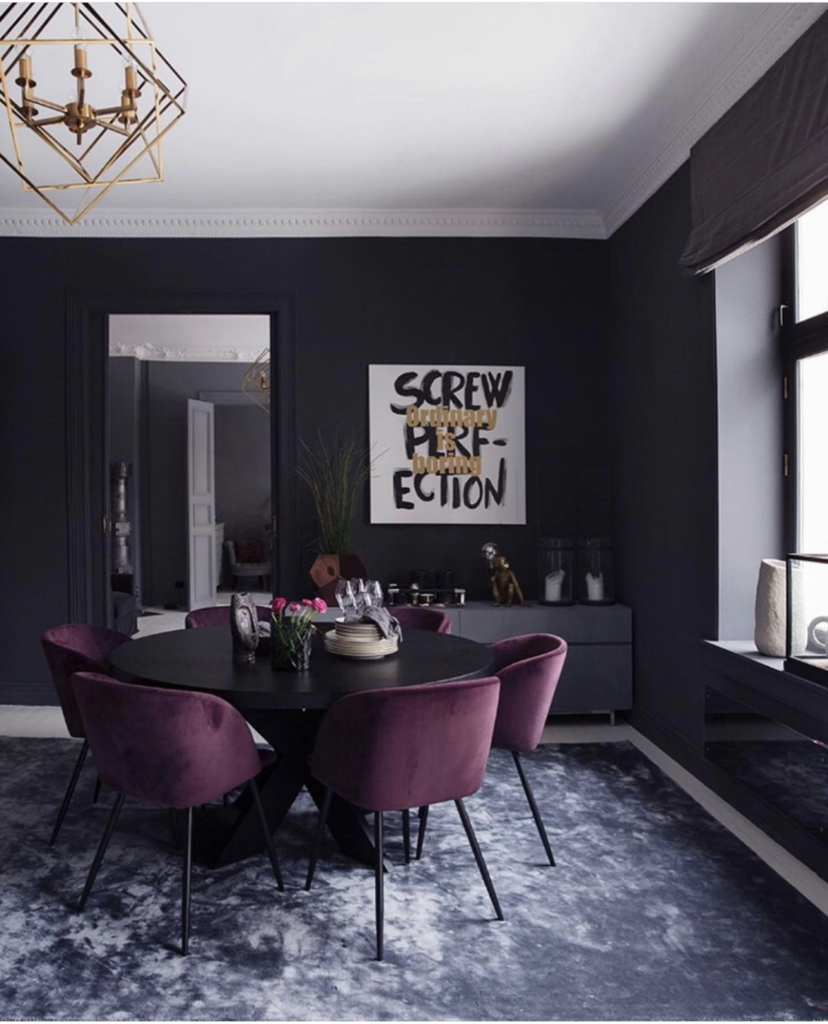So back in February, I posted an image on our Instagram feed in which the artwork said exactly the title of this blog — screw perfection!

Yet this is so easy to say BUT so so hard as an Interior Designer to do.
Perfectionism seems to be part of our innermost design DNA and yet is the nemesis of any Interior Designer giving many of us sleepless nights.
So how does a Designer let go of perfectionism and why is that important?
Perfection can cost us time and money, and even result in losing some innovative solutions. Perfection can be an unwelcome distraction!
Don’t spend a dollar’s worth of time on a 10 cent decision.
Time is our most valuable commodity — time is finite; it’s the one thing we don’t get more of. If I could spin and weave time, I’d be a wealthy, and probably more relaxed, woman! And yet we’ve all found ourselves at some point spending hours debating something that is pretty insignificant in the grand scheme of things; focussing on the minutiae of a project or installation piece, trying to get it ‘just so’ —‘ just perfect’.
We must value our time — spend it wisely. We, as designers, have a tendency to spend way too long on stuff that really doesn’t matter or that doesn’t make any significant difference, when we should be focussing on the important things.
Please note – I’m not suggesting a more slapdash or ‘that’ll do’ attitude to our work — heavens, our attention to detail is what sets us apart — but getting to a point when we are satisfied that we have done the best we can, in the time we have, and concentrating our resources and ourselves on something that will make a greater difference.
This means getting really strict with ourselves and stepping away when we have spent that allocated time on that particular job or element. Also don’t forget, the client is often unlikely to notice the difference in the final product or design and will be completely unaware that you have spent an additional three hours trying to source the perfect 6-inch decorative glass bowl for the sideboard in bedroom No. 3 or perfecting the lines of a leaf of a plant on a CAD drawing. Yes, I know many of you will identify with this activity well.
So, no more frittering time away…spend time in the right place, work smart, be efficient and make a bigger difference.
Remember that not getting what you want or planned is sometimes a wonderful stroke of luck.
Ever had a time when things simply refused to go to plan? When everything seems to conspire against you. Things simply won’t go ‘right’ and are not perfect.
We can become frustrated or depressed, assuming we have failed. Refusing to accept anything other than perfect can be a constraint, holding us back personally and professionally. We can totally forget about the value of spontaneity. It can stop us from thinking more creatively, being our usual innovative selves, as we can become so hung up on the need for it to be ‘perfect’.
We can miss the opportunities, we overlook a ‘quirk’ that has, in fact, spectacular potential in its own right, we can ignore the ‘different’ as it deviates from the plan we have set in our heads.
We need to ask ourselves, do our plans really need to be so rigid? Can they not encompass something that arises spontaneously? Sometimes that ‘failure’, mistake or imperfection or unexpected event can afford us and our work the greatest benefits. A beautiful oops! (Check out the book ‘Beautiful Oops!’ by Barney Saltzberg)
Fleming discovered penicillin from a discarded Petri dish; the humble potato chip (crisps) was ‘invented’ in a fit of pique when a customer told a chef the potatoes were too chunky in a meal; and the Post-It note was created entirely by the glue not being strong enough during a piece of research. All wonderful strokes of luck rising from the ashes of imperfection.
It’s an age-old saying but we really do learn from our mistakes. We can review, refocus and reset the way we work. What went wrong? What went right? What can we do differently? How can we work smarter?
In our creative world, when we need an alternative design option because the first one doesn’t work (or more often at this post Brexit point – is not available), we often find ourselves with an even better solution than the original. When we adapt the way we work due to circumstances at that time, we can discover strategies that are more efficient and offer better outcomes – and we can end up adopting these new approaches in the future.
Perfectly Imperfect.
Perhaps take a moment to consider how great an impact imperfection may have on your life or decisions.
Increasingly in our supermarkets we now have fruit and vegetables branded as ‘perfectly imperfect’, dining out on being ‘wonky’, misshapen or ‘a little less than perfect.’ We as consumers have quickly realised that a wonky carrot and a straight carrot don’t necessarily taste any different – there’s nothing wrong with a little imperfection here and there. They all get grated, chopped or diced up in the long run anyway.
(As a wee bit of personal insight, I met my lovely Kiwi husband of 20 years on a holiday where my original departure date had become fully booked up, so I’d had to delay my departure for 3 days. I remember being so frustrated at the time as I was worried about being too late in the year to see the Aurora Borealis in Norway. My life doesn’t bear imagining if I had actually managed to make it onto the original trip!)
Also, what is ‘perfect’? What is perfect to one person may not be to another —like expectations, perceptions will differ. Flaws are part of the DNA of the human race (nobody is perfect) and as Interior Designers, we need to recognise that whilst we are all brilliant (of course!), we are not superhuman.
So, fellow designers, it is time to release ourselves from the shackles of ‘perfection’.
Focus on the things that matter, don’t waste your valuable time, be confident about being slightly less than perfect and embrace those mistakes. You may discover a sense of freedom, space and confidence to experiment, and you won’t be any less of a designer for letting go a little.
Metier Rendezvous is a peer support network for Interior Designers!
We provide day-to-day pro-active and friendly support for all our members.
Collaboratively, we believe in Community over Competition. We share business ideas, tips, brainstorm on projects together as well as forward on leads.
Why not find out why Interior Designers love being a Metier Member!
